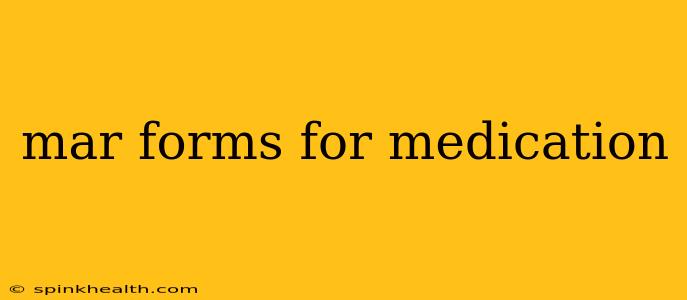Medication administration records (MARs) are the backbone of safe and effective medication management in healthcare settings. They're more than just a checklist; they're a vital legal document providing a complete chronological record of every medication given to a patient. This detailed guide explores the intricacies of MAR forms, demystifying their purpose and practical applications.
What is a MAR Form and Why is it Important?
Imagine a bustling hospital ward or a busy nursing home. Keeping track of hundreds of medications, administered to dozens of patients, each with unique needs and prescriptions, would be a logistical nightmare without a structured system. That's where the MAR form steps in. It acts as a central hub, meticulously documenting each medication administration event. This simple yet powerful tool ensures patient safety by:
- Preventing medication errors: A clear and concise MAR reduces the chances of administering the wrong medication, dose, or frequency.
- Ensuring accurate documentation: It provides a legally sound record of all medication administered, protecting healthcare providers from liability.
- Facilitating medication reconciliation: It aids in identifying discrepancies between prescribed and administered medications.
- Improving patient care: By providing a comprehensive overview, it allows for better monitoring of patient response to medication.
- Meeting regulatory requirements: MARs are a crucial aspect of complying with legal and professional standards.
What Information is Included on a MAR Form?
A typical MAR form includes, but isn't limited to, the following crucial information:
- Patient identification: Full name, date of birth, medical record number.
- Medication details: Name, dosage, route of administration (oral, IV, IM, etc.), frequency, and administration times.
- Healthcare provider's signature: Verification of medication orders.
- Nurse's signature: Confirmation of medication administration.
- Date and time of administration: Precise record-keeping.
- Any specific instructions: Special considerations for administration.
- Patient's response to medication: Observations regarding effectiveness and side effects.
What are the Different Types of MAR Forms?
MAR forms can vary depending on the healthcare setting and the specific software used. Some common variations include:
- Paper-based MARs: Traditional forms filled manually. While simpler, they are prone to errors and can be cumbersome to manage.
- Electronic MARs (eMARs): Computerized systems that offer increased accuracy, efficiency, and better tracking capabilities. These are increasingly common in modern healthcare.
- MARs for specific medication types: Some MARs may be designed for specific types of medications, such as controlled substances or intravenous medications, to enhance security and tracking.
How are MAR Forms Used in Different Healthcare Settings?
The implementation of MARs adapts to the specific needs of different healthcare environments:
- Hospitals: Often employ electronic MAR systems integrated with hospital information systems (HIS) for better coordination of care.
- Nursing homes: May use paper-based or electronic MARs depending on resources and technological capabilities.
- Home healthcare: Typically utilizes paper-based MARs, often with additional documentation to track medication usage and patient adherence.
How to Properly Fill Out a MAR Form?
Accuracy and precision are paramount. Here's a glimpse into the essential steps:
- Double-check the medication order: Ensure the medication name, dosage, route, and frequency align with the physician's order.
- Verify patient identity: Use two identifiers to confirm you're administering the medication to the correct patient.
- Administer medication: Follow established procedures for the specific route of administration.
- Document accurately: Record the date, time, and route of administration, along with any relevant observations.
- Sign and date the MAR: Confirm your identity and responsibility.
Remember, filling out a MAR is a serious undertaking with legal implications. Any inaccuracies can lead to serious consequences, so taking your time and verifying information is critical.
What Happens if There's a Medication Error?
Medication errors can have severe repercussions. In the event of an error, reporting the incident through the proper channels is crucial. This often involves:
- Immediate action: Addressing the immediate effects of the error.
- Incident reporting: Filing a formal report documenting the error.
- Root cause analysis: Investigating the cause to prevent future occurrences.
Open communication and a culture of safety are essential for addressing medication errors effectively.
This comprehensive guide provides a solid foundation in understanding MAR forms. Remember, patient safety is the ultimate goal. By using MARs correctly and diligently, healthcare professionals play a pivotal role in ensuring optimal patient outcomes.

